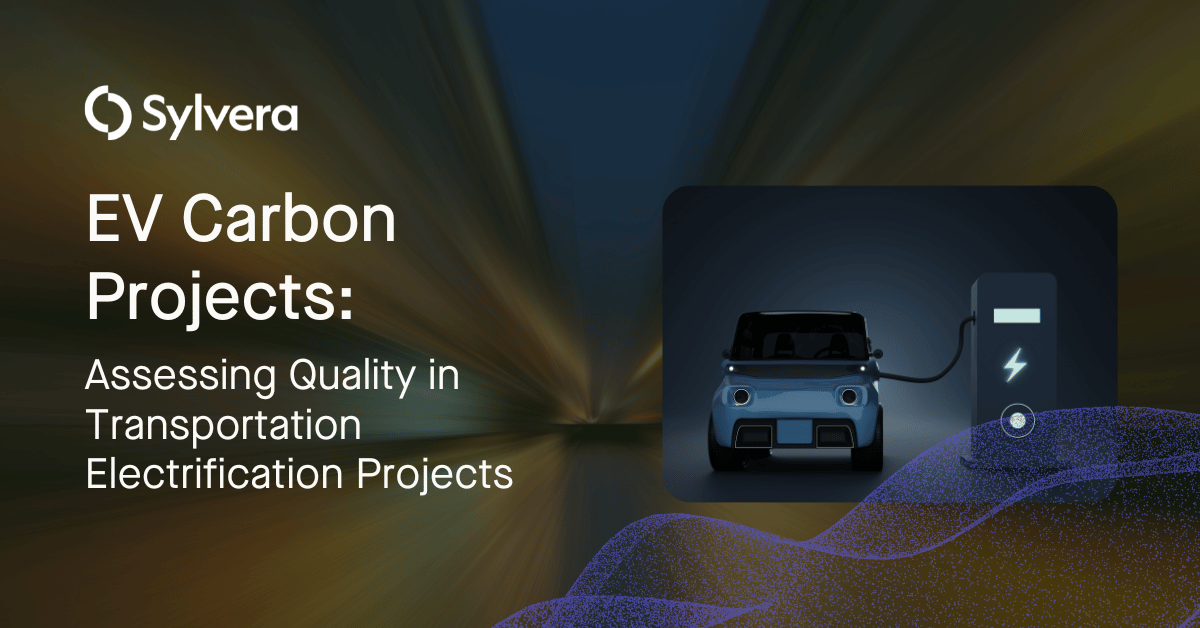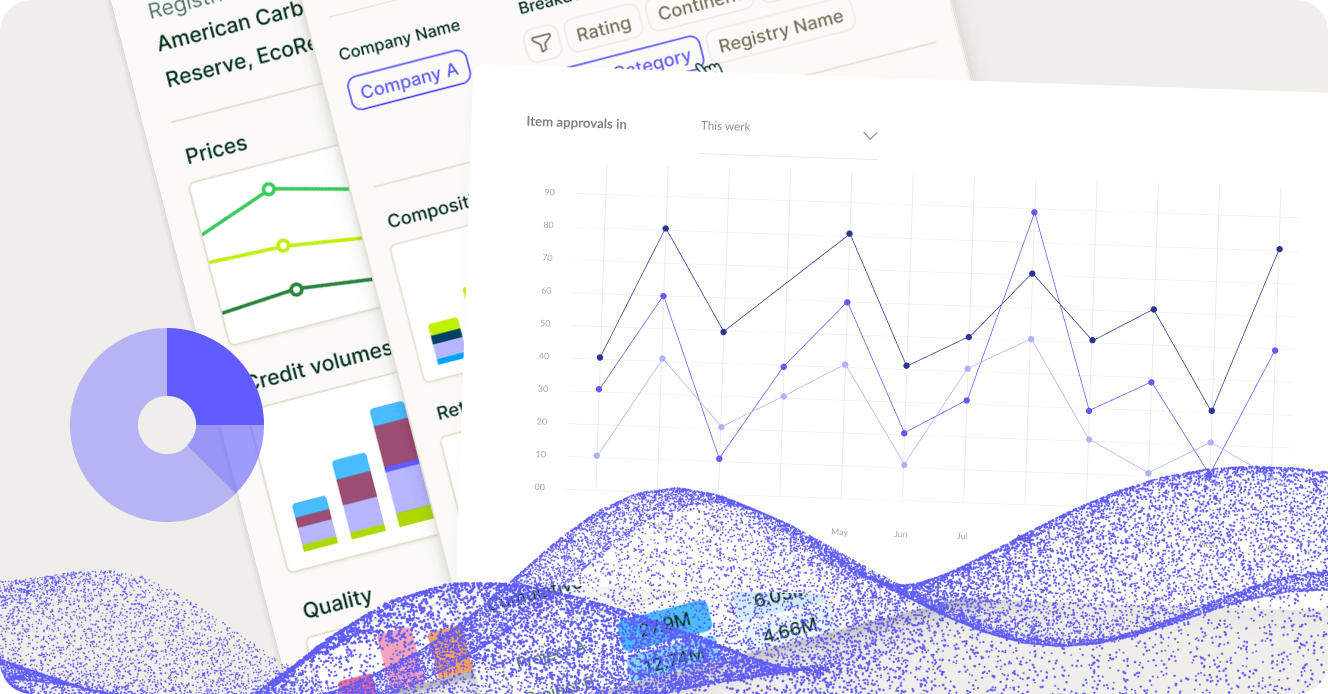“Over the years we’ve invested significantly in our field data team - focusing on producing trusted ratings. While this ensures the accuracy of our Ratings, it doesn’t allow the scale across the thousands of projects that buyers are considering.”
For more information on carbon credit procurement trends, read our "Key Takeaways for 2025" article. We share five, data-backed tips to improve your procurement strategy.

One more thing: Connect to Supply customers also get access to the rest of Sylvera's tools. That means you can easily see project ratings and evaluate an individual project's strengths, procure quality carbon credits, and even monitor project activity (particularly if you’ve invested at the pre-issuance stage.)
Book a free demo of Sylvera to see our platform's procurement and reporting features in action.
Companies face a challenge when reducing carbon dioxide emissions: they can't decarbonise what they can't measure. After all, decarbonisation is only as strong as the data behind it.
From establishing accurate carbon baselines to evaluating credit quality and meeting climate targets, companies need reliable carbon intelligence to make meaningful progress.
In this article, we explore the reasons why fragmented, inconsistent carbon data will hinder your efforts to make real climate impact. Then we'll show you how better carbon intelligence will help your company move from climate-related pledges to verifiable proof of climate action.
What is Decarbonisation? A Definition for 2026
Decarbonisation is the process of reducing (and eventually eliminating) carbon dioxide emissions across operations, supply chains, and investments. But decarbonisation doesn't equal net zero. It focuses on reducing carbon emissions at the source, rather than offsetting them via carbon capture projects or the purchase of carbon credits—two strategies that companies often use to hit zero net emissions.
Also worth mentioning, frameworks like the Corporate Sustainability Reporting Directive (CSRD), Science Based Targets initiative (SBTi), and International Sustainability Standards Board (ISSB) support decarbonisation by demanding verifiable emissions data and transparent progress toward sustainable practices that will help ensure a low carbon economy.
When it comes to green economy and carbon data and transparency, Sylvera is your partner. Our platform helps companies evaluate their carbon market investments and translate decarbonisation goals into verifiable carbon offset performance. As such, our tools provide the carbon intelligence infrastructure for assessing carbon credits and removal projects that the above frameworks require.
The Data Problem Undermining Decarbonisation
Decarbonisation relies on visibility. The problem? Data in carbon markets is often fragmented and unreliable. This creates challenges for companies when reducing their carbon footprints:
- Inconsistent Emissions Baselines: Companies struggle to establish accurate starting points from which to measure CO2 emissions reduction efforts. Without standardized methods, different teams within the same organization may report conflicting data. When it comes to carbon markets, inconsistent project baselines and methodologies make it difficult to compare offset quality.
- Misaligned MRV Standards: Measurement, reporting, and verification (MRV) practices vary across registries and standards. This inconsistency makes it nearly impossible for companies to compare carbon offset project performance or verify claims about offset credits delivering genuine reduced emissions.
- Data Silos: Information is fragmented between corporate accounting, carbon markets, and removals. This prevents companies from understanding their complete climate strategy or making strategic decisions about renewable energy investments and low carbon fuels.
As a result of these problems, companies can't make data-driven, informed choices about their carbon investments, or prove progress toward climate-related goals. Thankfully, Sylvera's independent, accurate carbon data helps organizations bridge the data gaps in carbon markets and achieve meaningful climate action.
Why Better Carbon Data Is the Decarbonisation Multiplier
When it comes to decarbonisation, data quality drives credibility, efficiency, and scalability. This is because high-quality carbon intelligence serves three essential roles:
- Measurement: Establishing reliable baselines and tracking emissions reductions for carbon offset and removal projects requires consistent, verifiable data. Understanding the actual impact of carbon credits and removal projects your company purchases is critical for making strategic climate investments and avoiding greenwashing.
- Investment: Finding high-integrity offsets or removal projects demands independent verification. As companies balance direct emission reductions with strategic use of carbon credits, they need transparent data to distinguish legitimate carbon capture projects from greenwashing. This intel helps companies allocate capital effectively.
- Disclosure: Verifiable evidence for ESG and financial reporting ensures regulatory compliance and protects against reputational damage. Stakeholders demand proof of progress on GHG emissions reduction and credible pathways to net zero emissions. Companies need reliable data on their carbon market investments and offset portfolios to support their climate claims.
Sylvera combines rigorous scientific carbon methodology and quality ratings with real-time market analytics. The result? Our platform turns carbon market data into decision-ready intelligence for offset procurement and carbon investment strategies.
From Data Gaps to Carbon Intelligence
Companies face many data gaps, from evaluating offsets, assessing removal projects, and optimizing procurement decisions to tracking carbon investment performance.
This is why basic carbon accounting falls short. To ensure your decarbonisation efforts are effective, you need to invest in ongoing validation and context to fill the gaps in your data, including carbon credit investments.
Sylvera’s platform integrates carbon project performance analytics, providing companies with the context they need.
And our Market Intelligence suite enables scenario modeling, pricing transparency, project risk assessment, and comparative benchmarking. In other words, our platform offers information you can use to make strategic carbon offset and removal investment decisions in ways that match your company's climate strategy.
For instance, procurement teams can use Sylvera to identify high-quality projects aligned with their climate targets while avoiding overpaying. Investment teams can use it to assess whether emerging technologies merit capital allocation. And ESG teams can demonstrate to stakeholders and regulators their company's progress towards net-zero goals.
The Role of Data Standardisation in Decarbonisation
Fragmented methodologies across registries and standards create inconsistencies.
When your company evaluates carbon projects it encounters dozens of data infrastructures, many of which are incompatible. This makes it difficult to compare options or assess quality. As such, fragmentation slows projects that could reduce global greenhouse gas emissions.
Data standardisation, on the other hand, improves comparability, transparency, and trust across the market. When everyone uses common definitions and structures, companies can identify projects that align with their goals to limit global warming and reduce their carbon footprint.
To aid data standardisation, Sylvera co-chairs the Carbon Data Open Protocol (CDOP), a collaboration of 50+ organizations who are developing an open data protocol to increase transparency and consistency in carbon markets. CDOP Version 1.0 provides standardized definitions for five foundational data categories: location, project details and approach, disclosures, and issuances. The goal? To create technical alignment across registries, platforms, buyers, project developers, and institutional investors
Why ESG and Finance Teams Need Independent Data
It's simple: Data independence equals credibility.
ESG teams can't rely on self-reported emissions or developer data when evaluating carbon offsets and removal projects. Your company's ability to comply with regulations and maintain its reputation depends on accuracy. Fortunately, independent intelligence mitigates critical risks:
- Greenwashing Risk: Without third-party verification, companies might invest in projects that fail to deliver promised emission reductions. Independent assessment helps organizations distinguish genuine climate action from pure marketing claims.
- Double-Counting: As carbon credits move through complex market structures, the same emission reduction can be claimed by multiple parties. Independent tracking prevents this issue from undermining a company's climate strategy.
- Reputational Damage: The public is increasingly skeptical of corporate climate commitments. Companies that make unverified claims about their carbon offset investments face significant backlash when those claims are proven false.
Sylvera's neutral, science-based verification gives investors confidence in their decarbonisation claims. Our platform's independent ratings offer comprehensive quality assessments, allowing companies to benchmark projects and make investment decisions that reduce global emissions.
How Better Data Improves Every Stage of Decarbonisation
Better carbon data creates value throughout the entire decarbonisation journey by transforming how organizations approach emission reduction. Here's a quick chart to illustrate:
When evaluating carbon market investments, organizations need clear baselines for carbon offset project greenhouse gas emissions impact. Better data helps assess carbon credit quality and identify opportunities for high-integrity offset investments. Companies can then pinpoint which carbon removal and offset projects will deliver the greatest impact toward their carbon neutral goals.
During procurement, verified ratings help teams distinguish high-integrity carbon capture and removal projects from lower-quality options. Investment decisions benefit from scenario modeling that projects how different carbon market strategies, from nature-based solutions to technological carbon removal, contribute to climate targets.
Reporting is easy with real-time data that supports disclosure requirements for carbon offset portfolios, while communication teams can make auditable claims about their carbon market investments
The Market Is Shifting Toward Intelligence, Not Pledges
Regulations and investor scrutiny have changed how companies approach climate strategy.
The CSRD and SEC climate disclosures, as well as the Task Force on Nature-related Financial Disclosures (TNFD) represent a shift from voluntary commitments to mandatory, verifiable reporting on efforts to reduce GHG emissions and limit rising global temperatures.
The era of "good intentions" is over. Transparency is the new currency in corporate climate action. All stakeholders, from investors to customers to regulators, demand proof that organizations are reducing their carbon footprint, not just making aspirational statements.
The truth is, decarbonising will succeed when it's powered by credible carbon data, not claims. Companies need intelligence to understand how their investments in carbon markets—from verified offset projects to emerging removal technologies—lead to measurable progress.
Sylvera's Market Intelligence platform provides the data organizations need for strategic decision-making by combining pricing details, quality assessments, and market trend analysis into one comprehensive platform that enables companies to make confident carbon investment decisions.
The Future: From Decarbonisation Plans to Proof
The next generation of decarbonisation strategy depends on verifiable results.
As the urgency to limit global warming intensifies and the transition to a low carbon economy accelerates, technology, data integration, and intelligence separate leaders from laggards.
Companies that invest in robust carbon intelligence infrastructure today position themselves for success tomorrow. They'll be able to demonstrate real progress through credible carbon market investments and prove their carbon offset and renewable energy investments deliver real climate benefits.
Sylvera enables measurable, reportable decarbonisation progress. As such, our platform is an important tool for building trust with regulators, investors, and consumers.
Reduce Carbon Emissions and Fight Climate Change
Decarbonisation success requires data precision, not aspirational claims. After all, you can't reduce what you can't measure—and you can't prove progress without independent verification.
With better data and actionable intelligence, your company can align its strategies with science, avoid credibility risks, and accelerate toward genuine net zero emissions outcomes.
Sylvera can help. Our platform delivers data intelligence that makes decarbonisation investments measurable, defensible, and real. Book a free demo to see Sylvera in action.





.png)









